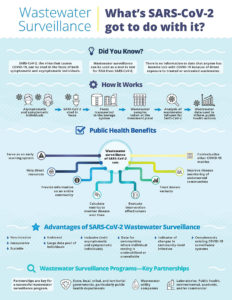
CHICAGO – The state of Illinois announced it is launching a program to protect school children from COVID-19 and reduce its spread through classrooms by analyzing school wastewater for the coronavirus. The project, which also will test for influenza, is an expansion of the Illinois Wastewater Surveillance System, a partnership between the Illinois Department of Public Health and the University of Illinois’ Discovery Partners Institute. The 25-week pilot project will encompass up to 20 schools across the state. The effort will be the first of its kind in Illinois. Because of its expected cost-effectiveness, it could be expanded to other schools and facilities where people congregate.
“IDPH is excited to partner with DPI and Shield T3 to expand the Illinois Wastewater Surveillance System and pilot this innovative new program to detect the spread of COVID-19 and influenza in our schools,” said IDPH Director Dr. Sameer Vohra. “IDPH prioritizes protecting our students and school staff from the spread of disease. We hope this pilot provides us with more information on how to best serve our Illinois communities.”
Schools qualifying for participation will be located within community sewersheds currently participating in the IWSS. Selected schools will include elementary, middle, and high schools in urban, suburban, and rural areas throughout the state.
The project is supported by Shield T3, a business owned by the University of Illinois System that grew out of the easy-to-administer PCR saliva test developed by university researchers in 2020. Shield T3 will lead wastewater sample collection and assist DPI in sharing data with school administrators. Shield T3 works in coordination with DPI, another U of I organization, that was created to bring research breakthroughs into the marketplace.
Samples will be collected from sewers or catch basins at each school twice a week while school is in session and then delivered to a University of Illinois Chicago testing laboratory. The SARS-CoV-2 and influenza viruses, like other pathogens, are shed in human feces. Once the amount of SARS-CoV-2 virus in the wastewater samples are analyzed and quantified, levels will be compared with school saliva testing results to determine whether combined wastewater sampling and saliva testing could be a reliable, more cost-effective approach to detect and limit spread of the virus.
For example, if there are no signs of the coronavirus, schools could safely continue to operate with eased precautions. If virus levels rise to a tipping point, however, administrators could require students, teachers, and other staff members to take saliva tests to pinpoint the scope of the outbreak and take other public-health actions to keep more children from being infected.
IDPH will fund the effort using federal COVID-19 relief funds and execute the project through its partnership with DPI which coordinates the wastewater surveillance program. DPI analyzes samples from more than 70 wastewater treatment plants in Illinois, as well as targeted surveillance sites for IDPH and the Chicago Department of Public Health.
The pilot project is also supported by University of Illinois Chicago, Northwestern University and Argonne National Laboratory.
It looks like you are not a member of VIP Club yet. Please fill out the form below to access the page and join the VIP Club






